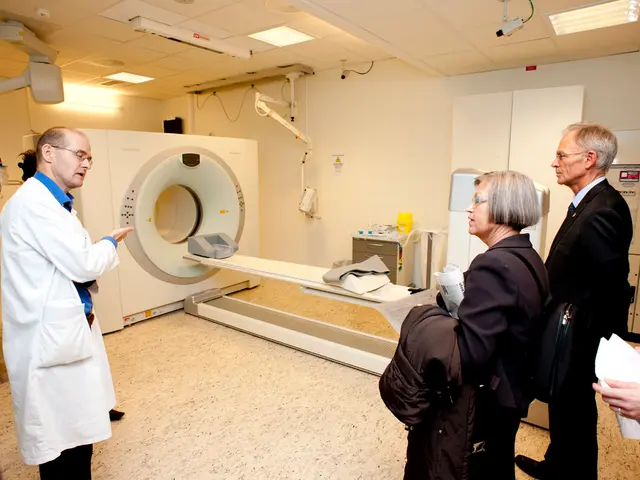Over a Quarter-Century, Potential Surge in Measles Cases in the U.S. due to Declining Vaccination Rates
Vaccine Decline: A Threat to Public Health
In the upcoming years, the United States could face a massive outbreak of infectious diseases such as measles, rubella, poliomyelitis, and diphtheria if vaccination rates drop, a new study reveals. With anti-vaccine sentiment gaining traction in the highest levels of the government, this grim prediction poses a significant threat to the nation's health.
Researchers at Stanford University simulated the impact of declining vaccination rates on several diseases. In a worst-case scenario, a 50% drop in childhood vaccinations would lead to a shocking 51.2 million measles cases over the next 25 years. This period would also witness nearly 10 million cases of rubella, over 4 million cases of poliomyelitis, and 197 cases of diphtheria. The consequences of such outbreaks would be devastating, resulting in 10.3 million hospitalizations and 159,200 deaths.
Even maintaining the same vaccination rate as 2025 would still result in more than 850,000 cases in the U.S. over the following 25 years. A mere 10% drop in MMR immunization rates could cause an alarming increase in measles infections, with a staggering 11.1 million cases in the U.S. over the next 25 years. On the other hand, a 5% increase in vaccinations would limit cases to just 5,800. A vaccination rate of approximately 95% is necessary to attain herd immunity for measles. The researchers estimate current vaccination coverage in their models to range between 87.7% and 95.6%.
State-by-state immunization rates vary. For instance, New York reported an estimated childhood vaccination rate of 97.7% for the 2023-24 school year, while Idaho saw a dismal rate of only 79.6%.
Before the introduction of the measles vaccine in 1963, approximately 3-4 million Americans contracted the measles annually. Tens of thousands were hospitalized, and 400-500 deaths were recorded each year. Unfortunately, the U.S. is currently experiencing its worst measles outbreak in a quarter of a century, with at least 800 cases reported in 25 states. Three deaths have been documented this year, including two children in Texas and an adult in New Mexico.
Parents of victims claim they have no regrets regarding their decision not to vaccinate their children. The parents of a 6-year-old girl who died from measles in February said they were adamant about not vaccinating her, while the father of an 8-year-old girl who passed away in April asserted that her death was unrelated to measles and inadequate hospital care. Both families have been associated with a fringe anti-vaccine organization that falsely claims vaccines cause autism.
In a troubling development, Robert F. Kennedy Jr., the current head of the Department of Health and Human Services, was once chair of this anti-vaccine group. Kennedy recently pledged to reveal the cause of autism by the fall. His crusade includes leading the Make America Healthy Again (MAHA) movement and assembling a team of scientists to investigate what he calls an autism "epidemic." Kennedy has also been reportedly working on a database of autism cases, using Americans' private health records to compile the data.
Kennedy's recent speech revealed concerns about a decline in testosterone levels among American boys, as well as an increase in various conditions such as ADD, ADHD, speech delay, and language delay. He suggested that these new or previously unrecognized diseases were components of an autism "epidemic."
However, it's important to note that these ailments may have gone undiagnosed or overlooked in the past, and those affected may have been institutionalized, as was Kennedy's own aunt, Rosemary Kennedy, who was lobotomized in the early 1940s. Her existence was kept a secret for decades, and she was denied visits by her father for 20 years.
With anti-science crusaders like Kennedy in positions of authority and working to erode trust in vaccines, the future of public health is uncertain. Kennedy's ideas echo eugenicist rhetoric and threaten to complicate efforts to maintain high vaccination rates, increasing the risk of disease outbreaks and endangering countless lives.
Without a concerted and evidence-based approach to overcoming obstacles to vaccine uptake, America will continue to see preventable illnesses surge. The escalating influence of misguided health officials and their anti-vaccine ideologies leaves us with little hope for a safer, healthier tomorrow.
- In the future, technology and health news outlets, such as Gizmodo, might report on a potential public health crisis due to an increasing decline in vaccination rates, which could lead to outbreaks of diseases like measles, rubella, poliomyelitis, and diphtheria.
- The consequences of such disease outbreaks, if vaccination rates drop significantly, could be catastrophic, resulting in millions of hospitalizations and thousands of deaths.
- The study simulated the impact of declining vaccination rates on various diseases and found that a 50% drop could result in over 51 million measles cases in the next 25 years.
- Even maintaining the same vaccination rate as 2025 could lead to over 850,000 cases in the United States over the following 25 years.
- In the political landscape of health-and-wellness, policy-and-legislation, and general news, the role of Robert F. Kennedy Jr., the head of the Department of Health and Human Services and a former chair of an anti-vaccine organization, is a cause for concern.
- Kennedy's crusade, which includes the Make America Healthy Again (MAHA) movement and a team of scientists to investigate the cause of autism, has raised eyebrows given his history with anti-vaccine sentiments.
- Despite the alarming increase in measles cases and deaths, some parents of victims have expressed no regret over their decision not to vaccinate their children, citing allegations that vaccines cause autism – a claim that has been debunked by science.
- The future of public health is uncertain, with the rise of anti-science sentiments and the erosion of trust in vaccines, challenging the efforts to maintain high vaccination rates and potentially causing preventable illnesses to surge.







